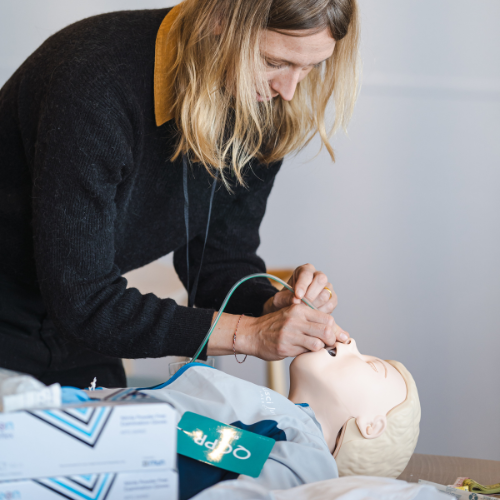About the AST
Embark on a journey in anaesthetics through the Rural Generalist Anaesthesia Training Program, a joint initiative of the Australian and New Zealand College of Anaesthetists (ANZCA), the Australian College of Rural and Remote Medicine (ACRRM) and the Royal Australian College of General Practitioners (RACGP).
The colleges provide a training program leading to the qualification of Rural Generalist Anaesthesia (RGA), equipping you with the skills to deliver safe anaesthesia and perioperative care in rural and remote settings, covering elective and emergent surgeries, including obstetrics and paediatrics.
As an RGA, you'll have the expertise to resuscitate and stabilise patients for transfer when needed, while recognising the boundaries of your expertise and engaging in continuous professional development to meet community needs.

Curriculum highlights / credentials
The Rural Generalist Anesthesia training program is modelled on the ANZCA curriculum and builds from the relevant core curricula of the ACRRM and RACGP Fellowship programs. It consists of three core sections:
1. Rural Generalist anaesthesia roles in practice
Define trainee behaviours as they pertain to anaesthesia and perioperative medicine:
- Medical expert
- Communicator
- Collaborator
- Leader and manager
- Health advocate
- Scholar
- Professional
2. Clinical fundamentals
Define the fundamental specialty knowledge and skills of anaesthetists applicable across all areas of practice:
- airway management
- general anaesthesia and sedation
- regional and local anaesthesia
- perioperative medicine
- pain medicine
- resuscitation, trauma and crises management
- safety and quality in anaesthetic practice.
3. Specialised study units
Define specialised knowledge and skills in paediatrics and obstetric anaesthesia and analgesia.
Where you can complete this AST
Training must be completed at a Rural Generalist Anaesthesia (RGA) accredited site. Find out more in the link below.
Member stories
Read stories from ACRRM members who did their AST in Anesthesia.
It wasn’t until the final year of my medical degree that I knew I wanted to become a rural GP. I had always been set on living and working in the country but had not been able to decide which specialty to train in.
Every time I started a new placement I would fall in love with that area of medicine and begin contemplating it as a career. The problem I had was that towards the end of each placement I would begin to grow restless and miss all the other aspects of medicine not covered by that specialty.
Frustrated by this, I decided to get out of the city and spend my six-week elective rotation in Omeo, which is a small town nestled in the middle of the Victorian Alps. The town clinic and hospital are run by a roster of dedicated locum GPs who spend weeks at a time being the only doctor within a few hours drive in any direction. I was amazed at the knowledge and versatility held by each of these doctors, who might spend the morning managing antenatal care and chronic disease, and then spend the afternoon dealing with a farm accident resulting in a flail chest and urgent air retrieval. There seemed to be no aspect of medicine that wouldn’t be covered during the course of a regular day.
I was also taken aback by how grateful the community was for this care and how welcoming they were towards me - a lowly medical student. In the short time I was there I became quite proficient at barefoot bowls and Thursday night drinks at the local pub soon became a ritual. I also heard far more stories from patients about wild dogs and missing hikers than I had ever hoped to! By the end of my rotation I was genuinely upset to be leaving but for the first time knew that rural generalism was the career choice for me.
Since then I have spent time working in several towns in North East Victoria and have been able to mould my training through ACRRM in order to develop the skills and experiences needed to become a competent and adaptable rural GP.
I have completed an AST in anaesthetics and have also been able to explore my passion for medical education by being the Registrar Medical Educator for my regional training organisation MCCC GP Training. This enables me to spend my week jumping between clinic sessions, hospital ward rounds, anaesthetic lists, on-call shifts and running teaching sessions via online videoconferencing (thanks COVID-19!). I can’t think of any other training program or career that allows for this amount of variety and individualisation and for this reason I would strongly encourage all junior doctors to consider specialty training with ACRRM.
Dr Christopher Pring is an ACRRM Australian General Practice Training (AGPT) registrar training in the Western Victoria region. If you’re interested to find out more about training to Fellowship on the AGPT Program, visit our website.
I can’t think of any other training program or career that allows for this amount of variety and individualisation.Dr Christopher PringAGPT Registrar
Got a question about training?
You can call us on 1800 223 226 or contact the training team.





